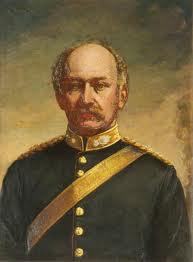
Tilgate is one of 14 neighbourhoods within the town of Crawley in West Sussex, England. The area contains a mixture of privately developed housing, self-build groups and ex-council housing. It is bordered by the districts of Furnace Green to the north east, Southgate to the north west and Broadfield to the south west.

Charles William Bigge was an English merchant and banker in Newcastle on Tyne.
The High Sheriff of Tipperary was the Sovereign's judicial representative in County Tipperary. Initially an office for a lifetime, assigned by the Sovereign, the High Sheriff became annually appointed from the Provisions of Oxford in 1258. Besides his judicial importance, he had ceremonial and administrative functions and executed High Court Writs.
The High Sheriff of Monaghan was the British monarch's representative in County Monaghan, a territory known as his bailiwick. Selected from three nominated people, he held his office for the duration of a year. He had judicial, ceremonial and administrative functions and executed High Court Writs.
The High Sheriff of County Galway was the Sovereign's judicial representative in County Galway. Initially an office for lifetime, assigned by the Sovereign, the High Sheriff became annually appointed from the Provisions of Oxford in 1258. Besides his judicial importance, he had ceremonial and administrative functions and executed High Court Writs.

James Clifton Brown JP was a British Liberal Party Member of Parliament (MP).
Charles George Ashburner Nix was a British sport shooter who competed at the 1908 Summer Olympics, where he won a silver medal.

Tilgate Park is a large recreational park situated south of Tilgate, South-East Crawley. It is the largest and most popular park in the area.
The High Sheriff of Carlow was the British Crown's judicial representative in County Carlow, Ireland from the 14th century until 1922, when the office was abolished in the new Free State and replaced by the office of Carlow County Sheriff. The sheriff had judicial, electoral, ceremonial and administrative functions and executed High Court Writs. In 1908, an Order in Council made the Lord-Lieutenant the Sovereign's prime representative in a county and reduced the High Sheriff's precedence. However, the sheriff retained his responsibilities for the preservation of law and order in the county. The usual procedure for appointing the sheriff from 1660 onwards was that three persons were nominated at the beginning of each year from the county and the Lord Lieutenant then appointed his choice as High Sheriff for the remainder of the year. Often the other nominees were appointed as under-sheriffs. Sometimes a sheriff did not fulfil his entire term through death or other event and another sheriff was then appointed for the remainder of the year. The dates given hereunder are the dates of appointment. All addresses are in County Carlow unless stated otherwise.
The High Sheriff of Leitrim was the British Crown's judicial representative in County Leitrim, Ireland from c.1582 until 1922, when the office was abolished in the new Free State and replaced by the office of Leitrim County Sheriff. The sheriff had judicial, electoral, ceremonial and administrative functions and executed High Court Writs. In 1908, an Order in Council made the Lord-Lieutenant the Sovereign's prime representative in a county and reduced the High Sheriff's precedence. However the sheriff retained his responsibilities for the preservation of law and order in the county. The usual procedure for appointing the sheriff from 1660 onwards was that three persons were nominated at the beginning of each year from the county and the Lord Lieutenant then appointed his choice as High Sheriff for the remainder of the year. Often the other nominees were appointed as under-sheriffs. Sometimes a sheriff did not fulfil his entire term through death or other event and another sheriff was then appointed for the remainder of the year. The dates given hereunder are the dates of appointment. All addresses are in County Leitrim unless stated otherwise.
The High Sheriff of Sligo was the British Crown's judicial representative in County Sligo, Ireland, from the 16th century until 1922, when the office was abolished in the new Free State and replaced by the office of Sligo County Sheriff. The sheriff had judicial, electoral, ceremonial and administrative functions and executed High Court Writs. In 1908, an Order in Council made the Lord-Lieutenant the Sovereign's prime representative in a county and reduced the High Sheriff's precedence. However the sheriff retained his responsibilities for the preservation of law and order in the county. The usual procedure for appointing the sheriff from 1660 onwards was that three persons were nominated at the beginning of each year from the county and the Lord Lieutenant then appointed his choice as High Sheriff for the remainder of the year. Often the other nominees were appointed as under-sheriffs. Sometimes a sheriff did not fulfil his entire term through death or other event and another sheriff was then appointed for the remainder of the year. The dates given hereunder are the dates of appointment. All addresses are in County Sligo unless stated otherwise.
The High Sheriff of Kerry was the British Crown's judicial representative in County Kerry, Ireland from the 16th century until 1922, when the office was abolished in the new Free State and replaced by the office of Kerry County Sheriff. The sheriff had judicial, electoral, ceremonial and administrative functions and executed High Court Writs. In 1908, an Order in Council made the Lord-Lieutenant the Sovereign's prime representative in a county and reduced the High Sheriff's precedence. However, the sheriff retained his responsibilities for the preservation of law and order in the county. The usual procedure for appointing the sheriff from 1660 onwards was that three persons were nominated at the beginning of each year from the county and the Lord Lieutenant then appointed his choice as High Sheriff for the remainder of the year. Often the other nominees were appointed as under-sheriffs. Sometimes a sheriff did not fulfil his entire term through death or other event and another sheriff was then appointed for the remainder of the year. The dates given hereunder are the dates of appointment. All addresses are in County Kerry unless stated otherwise.
The Sheriff of County Dublin was the Sovereign's judicial representative in County Dublin. Initially, an office for a lifetime, assigned by the Sovereign, the Sheriff became an annual appointment following the Provisions of Oxford in 1258. The first recorded Sheriff was Ralph Eure, appointed in that year. The next recorded Sheriff was Sir David de Offington, who was Sheriff in 1282. Besides his judicial importance, the sheriff had ceremonial and administrative functions and executed High Court Writs.
Sir George Barham was an English businessman and founder of the Express County Milk Company, later to become Express Dairies. He is sometimes described as the father of the British dairying industry.
SCL Group was a private British behavioural research and strategic communication company that came to prominence through the Facebook–Cambridge Analytica data scandal involving its subsidiaries Cambridge Analytica and Crow Business Solutions MENA. It was founded in 1990 by Nigel Oakes, who served as its CEO. The company described itself as a "global election management agency". The company's leaders and owners had close ties to the Conservative Party, the British royal family, British military, United States Department of Defense and NATO and its investors included some of the largest donors to the Conservative Party.

Alexander James Ashburner Nix is a British businessman, the former CEO of Cambridge Analytica and a former director of the Strategic Communication Laboratories (SCL) Group, a behavioural research and strategic communications consultancy, leading its elections division. Cambridge Analytica and its parent SCL were involved in psychological warfare operations for the British military and involved in influencing hundreds of elections globally; Cambridge Analytica helped Leave.EU with its Brexit campaign, according to both Leave.EU and Cambridge Analytica staff. The company was also engaged by the Ted Cruz and Donald Trump campaigns during the 2016 US presidential election. The company also ran Kenyan President Uhuru Kenyatta's campaign.
Nigel John Oakes is a British businessman, and the founder and CEO of Behavioural Dynamics Institute and SCL Group, the parent company of Cambridge Analytica and her sister AggregateIQ ; the companies became known to a wider audience as a result of the Facebook–Cambridge Analytica data scandal involving the misuse of data. From the early 1990s Oakes' companies, operating under succession of names, were involved in influencing elections in developing countries, and with the onset of the War on Terror they were also contracted by the British military. Oakes first became known as the boyfriend of Lady Helen Windsor in the 1980s.
John Ashburner Nix was an English businessman, estate owner, Conservative Party (UK) politician and barrister who served as High Sheriff of Sussex in 1911.

The Ashburner family is an English gentry family whose members were prominent as merchants and administrators in British-ruled India during the 18th and 19th centuries, especially during Company rule in India (1757–1858). The family's history is closely linked to the British East India Company and their activities in the Bombay (Mumbai) area.
Robert Vyner, of Gautby, Lincolnshire, was an English politician who represented Lincolnshire from 1794 to 1802.






